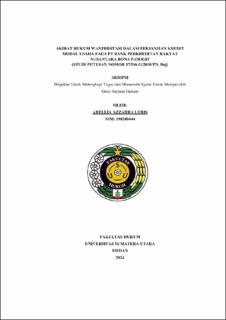| dc.description.abstract | Banks are financial institutions that play a role in collecting funds from the public in the form of deposits and then distributing these funds to the public in the form of credit to improve the standard of living of the general populace. One of the banks present in the community with credit facilities and frequently encountered is the People's Credit Bank (BPR). Although BPR provides credit facilities easily with principles of trust and prudence, non-performing loans or debtor defaults still often occur. The issues to be discussed in this research are the Legal Regulation of Credit Agreements and Business Capital Credit Agreements, the Implementation of Credit Agreements at the People's Credit Bank in Indonesia, and the Legal Consequences of Default in Business Capital Credit Agreements at PT Bank Perkreditan Rakyat Nusantara Bona Pasogit. The research method used in this study is the normative legal research method, specifically library research, which involves collecting secondary data, consisting of primary, secondary, and tertiary legal materials. Default is a condition where a person fails to fulfill or neglects to perform obligations in an agreement made between the creditor and the debtor. The cause of default is often due to the debtor's fault, such as deliberately failing to make agreed-upon credit payments. In Decision No. 37/Pdt.G/2018/PN.Bnj, BPR Nusantara Bona Pasogit sued the defendants for default. In this decision, the panel of judges made an appropriate ruling by ordering the defendants to pay a fine of Rp. 25,494,600. | en_US |


